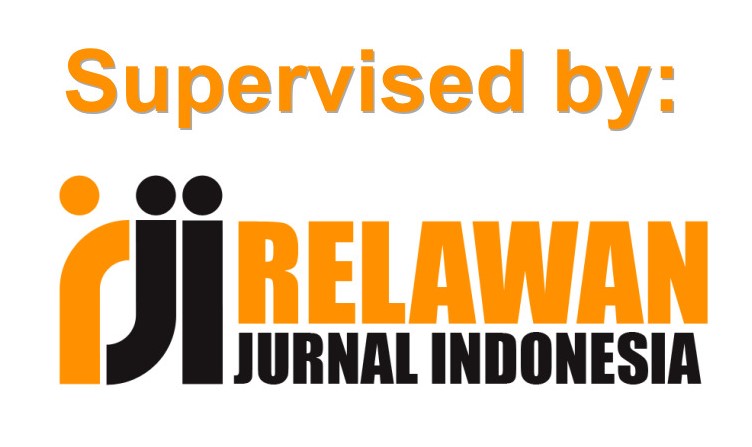The Influence Of Language Interest On Students Foreign Language Learning Outcomes (Arabic-English)
Abstract
Keywords
Full Text:
PDFReferences
Abdul Majid Sayyid Ahmad Manshur (1982), Ilmu Lughoh An-Nafsi, , ed. I,
Riyad : Mamlakah su'udiyah arobiyah.
Ag. Bambang Setiyadi, (2006), Metode Penelitian untuk Pengajaran Bahasa Asing (Pendekatan Kuantitatif dan Kualitatif), GrahaIlmu, Yogyakarta.
Ali Abdul Wafi, tt, Ilmu Lughoh. Cet. 9.Darun Nahdoh, Kairo.
Desmita. 2005. Psikologi Perkembangan, Remaja Rosdakarya, Bandung.
Djaali, (2013), Psikologi Pendidikan, Jakarta : Bumi Aksara
Fuad Al-bahyi As-sayyid, (tt), Al-asas An-nafsi Linamu, Mesir : Darul Fikri Al-Arobi.
Hasan Musthofa Abdul Mu'thi (1992), Ilmu Nafsi Tarbawi, Indonesia : Ma'had Al-Ulum AL-islamiyah wal Arobiyah.
Jam'ul huquqi Mahfuzah (2011), Thuruq At-tadris al-mawad ughoh al-arobiah,
Beirut : Darul Masrik.
Juwairiyah Dahlan, (tt), Metode Belajar Mengajar Bahasa Arab, Al-Ikhlas, Surabaya.
Kartini Kartono. 1995. Psikologi Anak (Psikologi Perkembangan), Mandar Maju, Bangdung.
Kumano, Y. 2001. Authentic Assessment and Portfolio Assessment-Its Theory and Practice. Japan: Shizuoka University.
M. Ali Al-Khuli, (1982), Asalib Tadris Al-lughotul Arabiyah, Al-firdaus Tijariah, Riyad.
Muhammad Hadi Afifi, (tt) , Usul At-tarbiyah wa Ilmu An-Nafsi, Qohiroh Maktabah Al-misri.
Muhibbin Syah, Psikologi Belajar, Jakarta : Rajawali, 2009
Siti Nurhasanah, A. Sobandi (2016), Minat Belajar Sebagai Determinan Hasil Belajar Siswa. Jurnal Pendidikan Manjemen Perkantoran, Vol.1 No. 1. UPI
Bandung.
Syaiful Sagala, 2010. Konsep dan Makna Pembelajaran, Alfabeta, Bandung.
Syamsudin dkk, (2007) Metodologi Penelitian Pendidikan Bahasa, Remaja Rosda Karya, Bandung.
Slameto, (1995) Belajar dan Faktor – Faktor yang mempengaruhinya, Jakarta : Rineka Cipta. Wayan Murkencana, 1986,
Evaluasi Pendidikan. Surabaya: Usaha Nasional.
W.S. Winkel, Psikologi Pengajaran, Jakarta : PT. Grasindo, 1996.
Zainul & Nasution. (2001). Penilaian Hasil belajar. Jakarta: Dirjen Dikti.
Zainul, A. (2001). Alternative assessment. Jakarta: Dirjen Dikti
Zalyana, 2010. Psikologi Pembelajaran Bahasa Arab. Al-Mujtahadah Press, Pekanbaru.
DOI: https://doi.org/10.24952/tazkir.v5i2.2306
Refbacks
- There are currently no refbacks.
Copyright (c) 2019 TAZKIR: Jurnal Penelitian Ilmu-ilmu Sosial dan Keislaman

This work is licensed under a Creative Commons Attribution-ShareAlike 4.0 International License.

This work is licensed under a Creative Commons Attribution-ShareAlike 4.0 International License.
Editorial Office:
Institute for Research and Community Services; Universitas Islam Negeri Syekh Ali Hasan Ahmad Addary Padangsidimpuan.
Jl. T. Rizal Nurdin Km. 4,5 Sihitang 22733 Padangsidimpuan, Sumatera Utara, Indonesia.
Phone: (+62) 634 22080 Faximili: (+62) 634 24022
e-mail: lppm@uinsyahada.ac.id
 View My Stats
View My Stats



